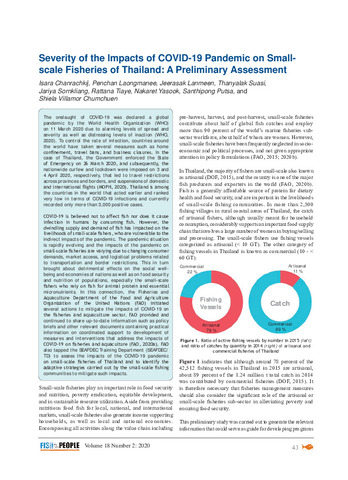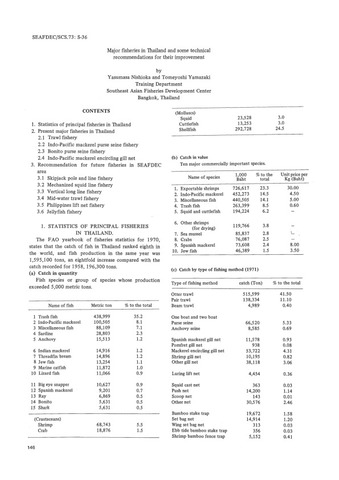Severity of the Impacts of COVID-19 Pandemic on Smallscale Fisheries of Thailand: A Preliminary Assessment
Share
ບົດຄັດຫຍໍ້
The onslaught of COVID-19 was declared a global pandemic by the World Health Organization (WHO) on 11 March 2020 due to alarming levels of spread and severity as well as distressing levels of inaction (WHO, 2020). To control the rate of infection, countries around the world have taken several measures such as home confinement, travel bans, and business closures. In the case of Thailand, the Government enforced the State of Emergency on 26 March 2020, and subsequently, the nationwide curfew and lockdown were imposed on 3 and 4 April 2020, respectively, that led to travel restrictions across provinces and borders, and suspensions of domestic and international flights (MOPH, 2020). Thailand is among the countries in the world that acted earlier and ranked very low in terms of COVID-19 infections and currently recorded only more than 3,000 positive cases.
COVID-19 is believed not to affect fish nor does it cause infection in humans by consuming fish. However, the dwindling supply and demand of fish has impacted on the livelihoods of small-scale fishers, who are vulnerable to the indirect impacts of the pandemic. The pandemic situation is rapidly evolving and the impacts of the pandemic on small-scale fisheries are varying due to changing consumer demands, market access, and logistical problems related to transportation and border restrictions. This in turn brought about detrimental effects on the social wellbeing and economies of nations as well as on food security and nutrition of populations, especially the small-scale fishers who rely on fish for animal protein and essential micronutrients. In this connection, the Fisheries and Aquaculture Department of the Food and Agriculture Organization of the United Nations (FAO) initiated several actions to mitigate the impacts of COVID-19 on the fisheries and aquaculture sector. FAO provided and continued to share up-to-date information such as policy briefs and other relevant documents containing practical information on coordinated support to development of measures and interventions that address the impacts of COVID-19 on fisheries and aquaculture (FAO, 2020a). FAO also tapped the SEAFDEC Training Department (SEAFDEC/TD) to assess the impacts of the COVID-19 pandemic on small-scale fisheries of Thailand and to identify the adaptive strategies carried out by the small-scale fishing communities to mitigate such impacts.
Suggested Citation
Chanrachkij, I., Laongmanee, P., Lanmeen, J., Suasi, T., Sornkliang, J., Tiaye, R., Yasook, N., Putsa, S., & Chumchuen, S. V. (2020). Severity of the Impacts of COVID-19 Pandemic on Smallscale Fisheries of Thailand: A Preliminary Assessment. Fish for the People , 18(2), 43-47. http://hdl.handle.net/20.500.12066/6563
ວິຊາ
Collections
Related items
Showing items related by title, author, creator and subject.
-
The Status of Fisheries in the Republic of Maldives
Faiz, Mohamed (Training Department, Southeast Asian Fisheries Development Center, 1997)The paper discusses the tuna fisheries in Maldives which dominates its fishing industry. Apart from a very strong domestic market, tuna is also the main export commodity of the country. Moreover, reef fisheries such as, ... -
Major fisheries in Thailand and some technical recommendations for their improvement
Nishioka, Yasumasa; Yamazaki, Tomeyoshi (Japan International Cooperation Agency, 1977)Presented in this paper is the development of fisheries industry in Thailand. The data on the production of the principal fisheries species and major fishing methods are also presented. Also included are the recommendations ... -
Status of Fishing Conditions in Cambodia
Sour, Kim; Vuthy, Ros (Training Department, Southeast Asian Fisheries Development Center, 1997)Fisheries in plays a very important role in Cambodia’s national economic development. Total fish catch production in 1996 was 104 310 tones, about which 60% was contributed by inland capture fisheries, 30% by marine capture ...





